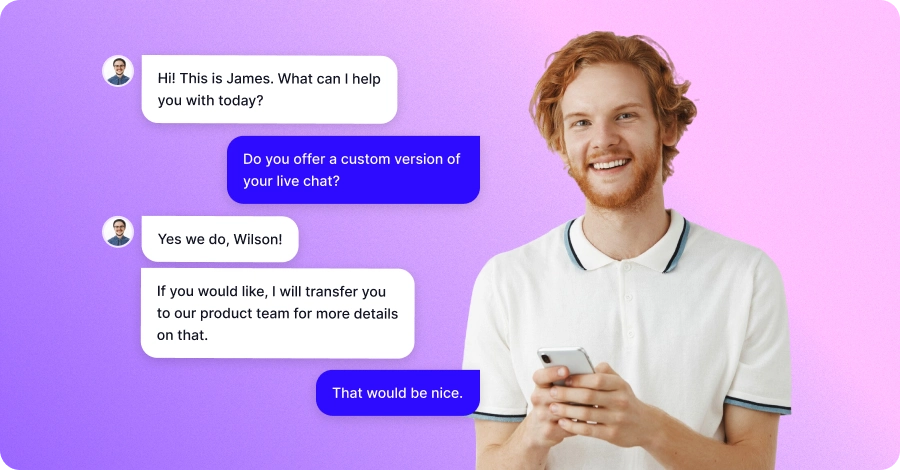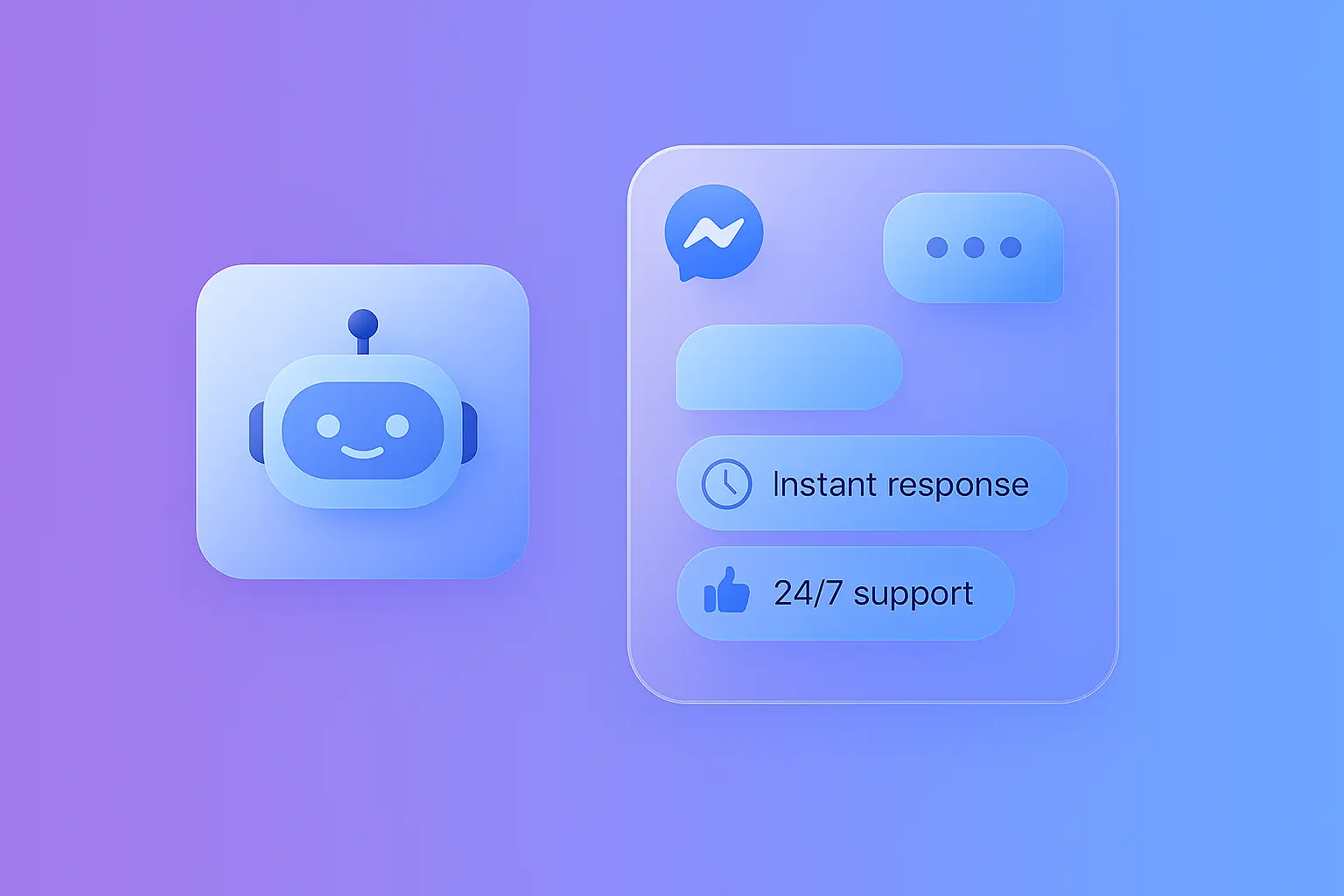What is The Future of AI? [Next Big Changes]
- May 26, 2024
- 12 mins read
- Listen

How does the future look like to you with Artificial Intelligence shaping most of our day-to-day tasks? Sometimes it feels like a mixed bag—there are moments of benefit, but also times when you see the downsides. We, however, need to prepare to embrace the future of AI with everything it brings to the table.
In the future of AI, a substantial number of tasks will be automated, giving rise to fresh job sectors in diverse industries. The AI-Human collaboration could lead to changes that the world has never experienced before. Technological advancement is expected to surpass current concerns about security and data risks, ensuring that AI becomes safer for universal use in the future. Let’s take a closer look at this discussion.
In this blog, we’ll uncover the key trends, emerging technologies, and transformative impacts that will shape our collective journey toward a more intelligent and interconnected world.
The History and Evolution of AI

History and evolution of artificial intelligence
The Future of AI: 6 Predictions No One Told You About
The AI future is full of possibilities. These six predicted impacts show how AI will greatly influence our lives, leading to a future where technology and daily life are interconnected.
1. The Automation, Transformation, and New Employment Sectors
AI advancements will automate 70% of existing jobs, subsequently generating new employment sectors.
AI is already transforming the workforce. For instance, in customer service, AI-powered chatbots handle over 80% of routine inquiries, freeing up human agents for more complex issues.
Similarly, the manufacturing industry employs AI-driven robots for precision tasks, which has resulted in a 20% increase in productivity. Moreover, the rise of AI has already created new roles such as data scientists and AI specialists, with the U.S. Bureau of Labor Statistics projecting a 31% growth rate for data science jobs by 2029, far exceeding the average for all occupations.
Looking to the future, as AI technology continues to advance, it is expected to take over even more complex jobs, such as those involving data analysis and decision-making. This large-scale automation could potentially displace workers in roles like financial analysis, legal research, and medical diagnostics.
However, there will be a rise in new job sectors. Companies will need skilled workers to regulate AI systems. This evolution will require a shift in workforce skills and a focus on continuous learning to adapt to the changing job landscape. Also, you need to let go of the misconception that AI will leave humans jobless. AI would rather collaborate with humans to fasten the work process and systems.
2. Enhanced Customer Service: Collaboration Between AI and Human Agents
The future of AI will introduce a new dynamic in customer engagement, enabling strong personalized communication through human and bot collaboration.
According to Gartner’s forecast, by 2025, around 80% of customer service and support entities will be utilizing generative AI in various ways to enhance both agent productivity and customer experience (CX). These AI systems, powered by advanced machine learning algorithms, can analyze vast amounts of customer data to deliver highly tailored experiences.
For instance, companies like Amazon and Netflix already utilize AI to recommend products. This personalized approach not only enhances customer satisfaction but also drives engagement and loyalty.
Moreover, the integration of AI chatbots with human agents allows for a hybrid model where bots handle routine inquiries. It frees up human agents to address more complex issues. This collaboration ensures that customer service is efficient, responsive, and highly personalized. For example, REVE Chat, a customer engagement platform collaborates the strength of AI-powered chatbot and human-touch to provide personalized experience for users It automates customer queries and solves complex issues faster. The platform has been assisting enterprises worldwide to maintain their customer satisfaction and reduce digital marketing channel costs.
3. A Future with safety at its Core: More Security Measures and Fewer Data Breaches
Artificial Intelligence’s future promises increased safety through better security measures and minimized data breaches.
Today, people are increasingly concerned about using AI due to frequent data breaches and inadequate security measures. A 2023 survey by the Pew Research Center revealed that 72% of Americans are wary of how their data is collected and used by AI systems. High-profile incidents, such as the 2020 breach of an AI-driven healthcare database that exposed millions of patient records, have exacerbated these fears.
However, the future seems to be more promising as tech enthusiasts are constantly looking to make AI safe for everyone. The financial sectors now are heavily reliant on AI for fraud detection and customer service. They reported a 30% reduction in security incidents after implementing advanced AI security protocols and encryption technologies.
Additionally, companies like Microsoft and Google are investing billions in AI research focused on enhancing cybersecurity. This concerning shift demonstrates a commitment to safer AI in the future.
4. The Future Transformation of Healthcare with Artificial Intelligence
AI in healthcare promises a future of personalized medicine, enhanced diagnostics, and robotic surgery.
Artificial intelligence (AI) is about to revolutionize healthcare, offering greater efficiency, accuracy, and personalized treatment. According to a report by McKinsey, AI applications in healthcare could generate up to $100 billion annually in savings by improving clinical operational efficiency. For instance, IBM’s Watson for Oncology is already aiding oncologists by providing evidence-based treatment options, significantly speeding up the decision-making process.
In the future, AI could enable predictive analytics, allowing for early detection of diseases like cancer and Alzheimer’s through advanced imaging techniques and genetic analysis. Personalized medicine will see a leap forward.
Moreover, healthcare professionals will be free from repetitive tasks such as data entry, appointment scheduling, and routine diagnostics.
5. AI in education: Personalizing Learning Experience and Virtual Tutors
Personalized learning with AI is already a common fact with artificial intelligence introducing many learning platforms in the market. For instance, platforms like Khan Academy and Coursera utilize AI algorithms to analyze learners’ behavior, preferences, and performance data to deliver tailored educational content. Additionally, AI-powered tools like Rosetta Stone and Duolingo offer personalized language learning. They adjust difficulty and content based on how well you’re doing.
AI tutors are projected to routinely analyze student data, like past performance and learning pace, to deliver personalized learning experiences by 2030. Artificial intelligence will transform the education system more efficiently. Individual learning would get more preference. Another aspect is that AI in education will introduce additional learning subjects to education, making formerly challenging topics more accessible.
6. Ethical and Societal Challenges Will Emerge as AI Becomes More Prevalent
AI programs have faced criticism for keeping biases found in the data they’re trained on. These may raise more concerns in the future causing ethical and societal dilemmas.
According to a report by the World Economic Forum, the widespread implementation of AI technologies is expected to disrupt labor markets, potentially displacing millions of workers globally by 2030. This displacement raises concerns about job loss, economic inequality, and the need for reskilling and upskilling programs to ensure a smooth transition.
Moreover, AI programs have faced criticism for keeping biases found in the data they’re trained on. This can result in unfair results in areas like hiring, legal decisions, and healthcare.
For example, a study published by the American Civil Liberties Union (ACLU) found that an AI-powered healthcare algorithm exhibited racial bias by recommending fewer interventions for Black patients compared to white patients with the same level of health needs.
Also, the use of AI in surveillance and monitoring raises concerns about privacy infringement. We need to start dealing with these issues now. We need ethical guidelines to ensure that AI technologies are developed and deployed responsibly for the benefit of society as a whole.
Why Artificial Intelligence is the Future of Growth?
Artificial intelligence (AI) is considered the future of growth for several reasons:
- Automation and Efficiency: It enables automation of tasks that were previously performed manually, resulting in increased efficiency and productivity. By leveraging AI technologies, businesses can streamline operations, optimize processes, and reduce costs. Automation allows employees to focus on higher-value tasks that require creativity and critical thinking, leading to overall business growth.
- Data Analysis and Decision-Making: With the proliferation of data in today’s digital world, AI plays a crucial role in analyzing vast amounts of data quickly and accurately. AI algorithms can extract valuable insights, identify patterns, and make data-driven decisions. This empowers organizations to gain a competitive edge, optimize strategies, and identify new business opportunities.
- Personalization and Customer Experience: It delivers personalized experiences by understanding customer behavior, preferences, and needs. By leveraging AI-powered recommendation engines, chatbots, and predictive analytics, businesses can deliver tailored products, services, and recommendations to their customers. Enhanced personalization leads to increased customer satisfaction, loyalty, and business growth.
- Improved Efficiency and Innovation: AI can enhance innovation by accelerating research and development processes. Machine learning algorithms can analyze vast datasets and generate insights that aid in product development, optimization, and innovation. By leveraging AI, organizations can bring new products and services to market faster and gain a competitive advantage.
- Enhanced Decision-Making: AI technologies, such as predictive analytics and machine learning models, provide businesses with valuable insights for decision-making. By leveraging AI-powered tools, organizations can make more informed decisions, reduce risks, and seize opportunities. AI also enables real-time monitoring and analysis, allowing businesses to respond quickly to changing market dynamics.
Future Implications of AI
With the predictions in mind, let’s take a closer look at how AI could impact our daily lives in the future. We’ve listed some common implications of AI in the future,
1. Human-like Creativity
With AI getting smarter, the idea of machines being creative like humans seems more possible. AI algorithms are already capable of generating art, music, and literature that mimic human creations. With further development, it might start generating new ideas, inventive designs, and artistic expressions that match human creativity.
2. Industry Automation
Industry automation driven by AI promises increased efficiency, productivity, and cost-effectiveness across various sectors. AI uses machine learning and predictive analytics to predict when maintenance is needed. It also forecasts demand and optimizes the supply chain. This helps to reduce downtime and makes sure resources are used efficiently.
3. Cybersecurity
AI algorithms will better identify vulnerabilities in cybersecurity systems in the future. However, as cybercriminals and cybersecurity experts both use AI to stay ahead, the challenge may intensify. There might come a time when we establish a safer space for AI with robust cyber security.
4. Quantum AI
Quantum computing marks a fundamental change in computing strength and capabilities. Unlike traditional computers, quantum computers use principles from quantum mechanics to do incredibly fast calculations, allowing for major advancements in solving problems that were once impossible to crack. The blend of quantum computing and artificial intelligence is a swiftly advancing area that could radically change many aspects of our future.
5. Robotic Prosthetics
In the future, robotic prosthetics will be an exciting breakthrough in healthcare and technology, giving people with limb loss or impairment better movement and abilities. Thanks to AI getting better, these prosthetic devices will be even more advanced, able to move like natural limbs and respond instantly to what the user wants.
Final Note
The future is unpredictable. We can only assume based on the present circumstances. Today’s scenario points to a future where AI usage will rise, making many tasks easier in different fields. However, it is crucial to navigate this technological evolution thoughtfully, addressing ethical concerns and ensuring equitable access. Embracing AI for the future can be beneficial for all with some precautions.
FAQs
How Will AI Change the World?
AI has the potential to transform the world in numerous ways. It will reshape how we live, work, and interact with technology, ushering in a new era of possibilities and opportunities.
What Industries Will AI Impact the Most?
Almost every industry will face some sort of changing shift with the rise of AI. However, it is predicted that a few sectors will have a heavy impact including healthcare, finance, retail, software, manufacturing, transportation, and education.
What will AI look like in 10 years?
Ten years from now, AI will be more intertwined with our daily activities, becoming even more advanced and capable of managing complex tasks and new scenarios.
Will AI Replace Humans in the Future?
Humans and AI will likely collaborate rather than compete. AI will serve as a tool to assist humans, improving job ease and efficiency without replacing human roles.
Go through also: What is AI? Types, Benefits, Use Cases & Examples






